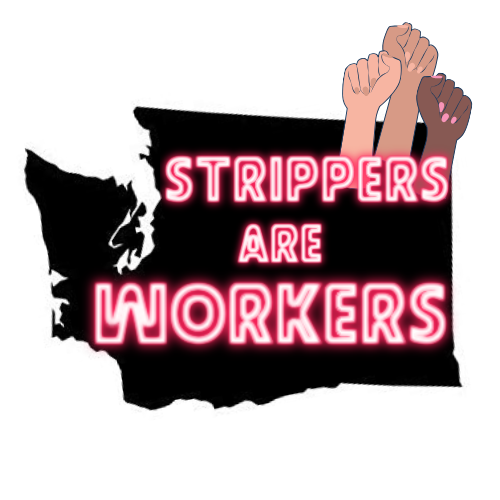Adult dancing can be a path to economic mobility for many workers in Washington. But right now, WA dancers are facing a predatory business model that strips workers of rights and fair pay. And we’re speaking out to change that.
We don’t get paid a wage by the clubs we work for — in fact, we have to pay to work. We’re required to pay the clubs “house fees” of $140 - $200 every night, plus additional fees and mandatory tip-outs to club staff, regardless of how much we make.
If we call in sick, miss a shift, or can’t pay our house fees, we can rack up “backrent” — money that we owe to the club. If we rack up too much “backrent,” we have to pay it off with the money we earn on future shifts and can even be blacklisted from working.
We face serious health & safety risks in our workplaces. We’ve had to deal with lack of access to the basics, like running water and working bathrooms. And for many of us, sexual harassment and assault are treated like they’re just part of our jobs.
Our profession is stigmatized, making it harder for us to fight for our rights in the workplace. Much of the focus on regulating our workplaces has been dedicated to anti-trafficking efforts, which often misguidedly treat us as victims rather than workers.
Dancers are workers, and we deserve the same rights all workers do. We shouldn’t be paying more money to work than what we can make. Our work shouldn’t be controlled and scheduled, especially given that we’re independent contractors. And we should know our rights and have a way to enforce them when they’re violated.
Dancers safety & security bill
Since July 2018, a group of dancers across WA have been coming together to talk about how we fight for change in our industry.
We met with legislators and told them what we wanted — and we won HB 1756, a safety & security bill for dancers, which has passed the WA House floor.
This is huge because it’s a first in WA: a bill affecting dancers that was actually initiated by dancers.
House fees & Backrent
Dancers are required to pay house fees of up to $200 a night to the clubs just to work. Regardless of how much money we make, we owe the clubs these fees every night we come in to work — which means we could work an entire shift and go home with less than what we came in with.
Sex work stigma
The stigma around sex work means our industry has often been overlooked when it comes to workers’ rights. But however you look at it, sex work is work, and we deserve the same protections all workers need. We need healthy, safe working environments. We need financial stability. And we need to know our rights & how to exercise them.





